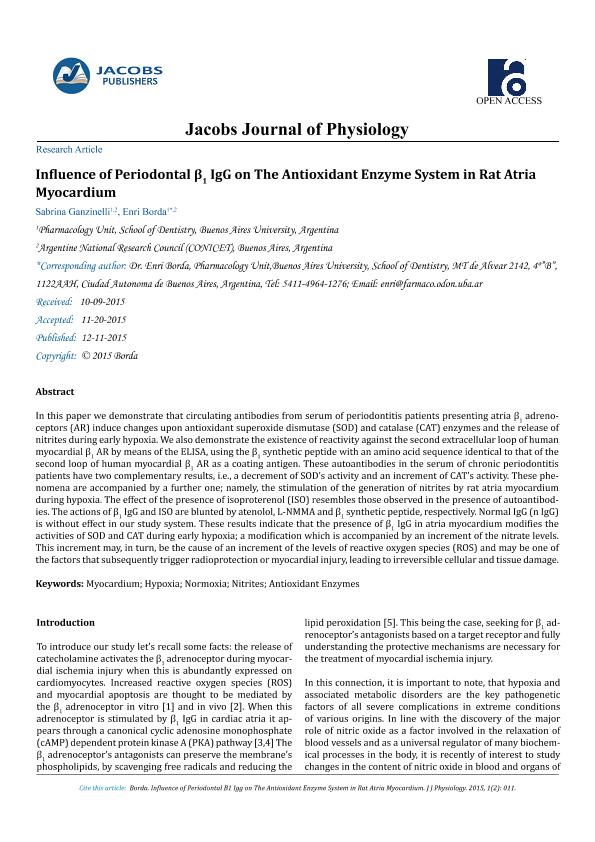Artículo
Influence of Periodontal β1 IgG on The Antioxidant Enzyme System in Rat Atria Myocardium
Fecha de publicación:
11/2015
Editorial:
Jacobs Publishers
Revista:
Jacobs Journal of Physiology
ISSN:
2475-496X
Idioma:
Inglés
Tipo de recurso:
Artículo publicado
Clasificación temática:
Resumen
In this paper we demonstrate that circulating antibodies from serum of periodontitis patients presenting atria β1 adrenoceptors(AR) induce changes upon antioxidant superoxide dismutase (SOD) and catalase (CAT) enzymes and the release ofnitrites during early hypoxia. We also demonstrate the existence of reactivity against the second extracellular loop of humanmyocardial β1 AR by means of the ELISA, using the β1 synthetic peptide with an amino acid sequence identical to that of thesecond loop of human myocardial β1 AR as a coating antigen. These autoantibodies in the serum of chronic periodontitispatients have two complementary results, i.e., a decrement of SOD?s activity and an increment of CAT?s activity. These phenomenaare accompanied by a further one; namely, the stimulation of the generation of nitrites by rat atria myocardiumduring hypoxia. The effect of the presence of isoproterenol (ISO) resembles those observed in the presence of autoantibodies.The actions of β1 IgG and ISO are blunted by atenolol, L-NMMA and β1 synthetic peptide, respectively. Normal IgG (n IgG)is without effect in our study system. These results indicate that the presence of β1 IgG in atria myocardium modifies theactivities of SOD and CAT during early hypoxia; a modification which is accompanied by an increment of the nitrate levels.This increment may, in turn, be the cause of an increment of the levels of reactive oxygen species (ROS) and may be one ofthe factors that subsequently trigger radioprotection or myocardial injury, leading to irreversible cellular and tissue damage.
Palabras clave:
Myocardium
,
Nitrites
,
Hypoxia
,
Antioxidant Enzymes
Archivos asociados
Licencia
Identificadores
Colecciones
Articulos(OCA HOUSSAY)
Articulos de OFICINA DE COORDINACION ADMINISTRATIVA HOUSSAY
Articulos de OFICINA DE COORDINACION ADMINISTRATIVA HOUSSAY
Citación
Ganzinelli, Sabrina Belen; Borda, Enri Santiago; Influence of Periodontal β1 IgG on The Antioxidant Enzyme System in Rat Atria Myocardium; Jacobs Publishers; Jacobs Journal of Physiology; 1; 2; 11-2015; 1-10
Compartir




